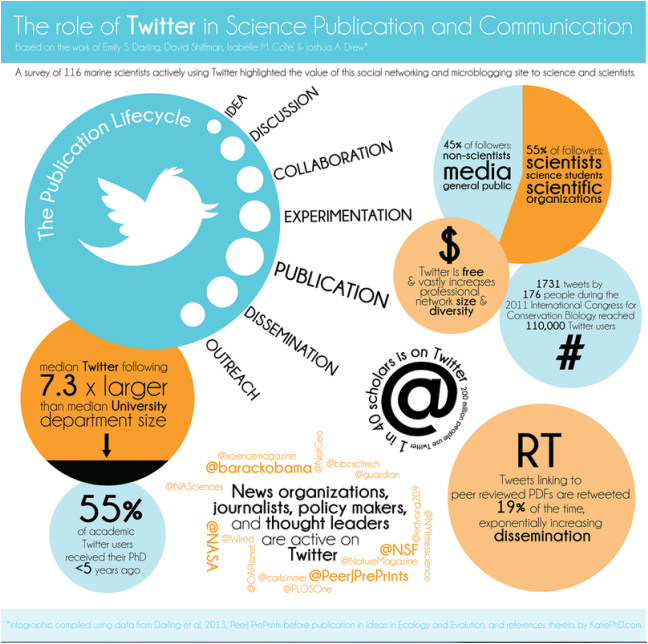Twitter is an online social media website, which allows users to send and read short messages (of 140 characters) called “tweets”.
1. Communication
Twitter is a great tool for academics to communicate about their research to other academics and to the public, to announce and share publications, and to write and debate about relevant research issues (in an unrestricted manner). Furthermore, scientists are using social media to circulate information about potential opportunities in their lab, upcoming events, or to post updates from meetings and conferences. Along with forging links between scientists, interactions on twitter can improve communication between scientists and the general public.
If you are shy or hesitant, twitter is a great forum to ask a question, voice your opinion, or to start up conversations with leaders (or anyone) in the field, a common problem for early stage researchers! Unlike a conference setting, twitter allows you to sit back and read a conversation between other scientists (without awkwardly standing there), and gives you plenty of time to think about a comment or response (if you feel like giving one).
Twitter is a tool for engaging and communicating with a massive global network of peers and researchers across the world. Twitter allows scientists at any stage of their career path to connect with other scientists, removing the barrier of status. You are able to connect with people who have similar (or very different yet fascinating) interests. Twitter, unlike other social media websites, allows for real time conversations to happen, so you can get direct input and feedback from other academics and the general public. It is a great equaliser and allows for easy communication with people whom you might not ever interact with otherwise.
Are you attending a conference? Twitter can connect you with people who share similar interests to you before you even get there. If you cannot make the conference, following a conference hashtag (e.g. #ESA2014) can keep you informed with what’s happening, who presented, what people thought, what was particularly interesting etc.
Twitter allows you to get your message out there, and the potential platform is immense: compare an audience at a conference with the potential online audience of twitter. For instance, 1731 tweets by 176 people during the 2011 International Congress for Conservation Biology reached 110,000 Twitter users. Not bad! More info here.
Scientists want other people to read about their research right? Studies have shown that tweets linking to peer reviewed PDFs are retweeted 19% of the time, exponentially increasing dissemination.
Click here for tips on how to use twitter and blogging to disseminate your research.
Twitter can be used to keep up to date with the most recent published articles (you can follow journals directly) and is a great resource for scientific inspiration (e.g IFLScience). It is exciting to read other people being enthusiastic about their work, debating with others and communicating with experts in other fields about research that’s happening as we speak. I follow a lot of field biologists and natural historians (e.g. @SeymourDaily) who will often post photos from the field (@Primate and predator) which keeps me excited about nature.
Are you a biologist with a secret passion for astronomy? Twitter allows you to follow whoever you like. You can follow astronomers, NASA, explore hashtags relating to astronomy… giving you access to current and exciting research you might never have learnt about otherwise.
Twitter allows you to enhance your online visibility, it can be very useful to have an online presence these days, especially as an early stage researcher. Who knows, maybe this “getting noticed” could help in the highly competitive job market.
Following a lab group or researcher that you are interested in working with can be a good way to stay up to date on their research, and learn about opportunities in their lab as they come up, all improving your likelihood of getting job. Following that, there are various useful twitter feeds, such as conservation careers (@conservcareers) that post job opportunities on a daily basis.
There are loads of specialised groups that are aimed at grad students helping other grad students (#phdchat). For example: tweets by the thesis whisperer team (@thesiswhisperer) offer advice and useful tips on writing and other PhD related stuff. If you are having problems with statistics, there are lots of specialist groups such as R-package related hashtags #rstats, or you could also follow @Rbloggers and statistics for biologists @statsforbios to name a few.
- How to use blogging and microblogging to disseminate your research
- A scientists guide to social media
- The use of social media to scientists
Humour: if twitter had existed at a time of great scientific breakthroughs

@NaiaraOMahony
Naiara is a third year PhD student in CEG, studying the impact of climate change on migrant avian distributions at a global scale.

 RSS Feed
RSS Feed
